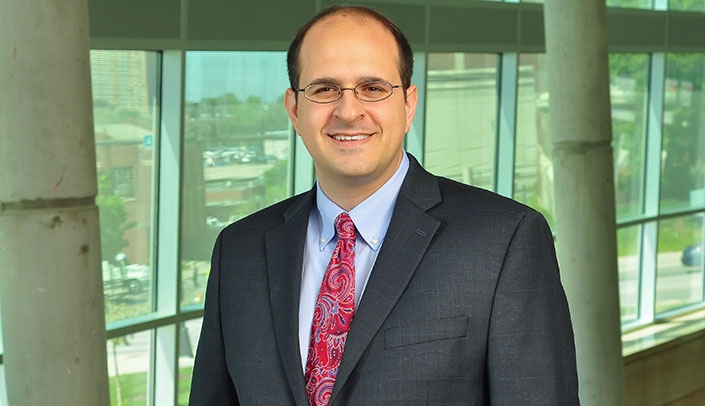A National Institute of Biomedical Imaging and Bioengineering (NIBIB)-funded study led by Aaron Mohs, PhD, associate professor of pharmaceutical sciences, has been featured as a "Science Highlight" by NIBIB and the National Institutes of Health (NIH).
The NIBIB periodically picks selected NIBIB-funded research to present to a greater national general-interest audience. This chapter of Science Highlights shows how scientists in Dr. Mohs’ UNMC lab "have engineered an inexpensive, paper-based test that can rapidly identify multiple types of bacteria." They call it "Paper-Based Ratiometric Fluorescent Sensor Array."
The article credits the UNMC research team for using a "complex blend of microbiology, chemistry, and artificial intelligence (AI) to create a testing platform that appears deceptively low-tech — built for use in remote low-resource environments such as field hospitals and rural clinics."
It adds: "Every aspect of the test was designed for potential use in even the most remote parts of the world, where current techniques that require sophisticated equipment and expertise are not feasible."
"This project is an extraordinary example of how making something simple requires the use of multiple complex technologies," Tatjana Atanasijevic, PhD, scientific program manager of the program in bioanalytical sensors at NIBIB, said in the article.
Research assistant professor Denis Svechkarev, PhD, and graduate student Aayushi Laliwala also earn shout-outs in the story. So do collaborators Marat Sadykov, PhD, and Kenneth Bayles, PhD, from the College of Medicine’s Department of Pathology and Microbiology.
To read all about the NIH’s coverage of this breakthrough project, click here.

Congratulations Aaron and your team for this innovation. Best wishes now and for the future.
Howie Gendelman
Congrats, Aaron and team! Smart idea and great work!
Congratulations Dr. Mohs!!
Congratulations Aaron and Denis – absolutely outstanding work from you and your team!
CONGRATULATIONS! Dr. Mohs for the well deserved recognition.
Very cool innovation. Congratulations to all involved.